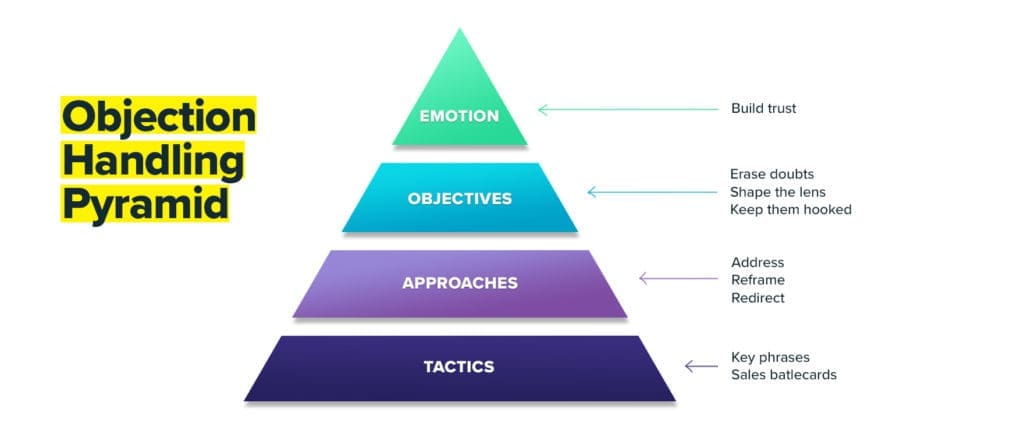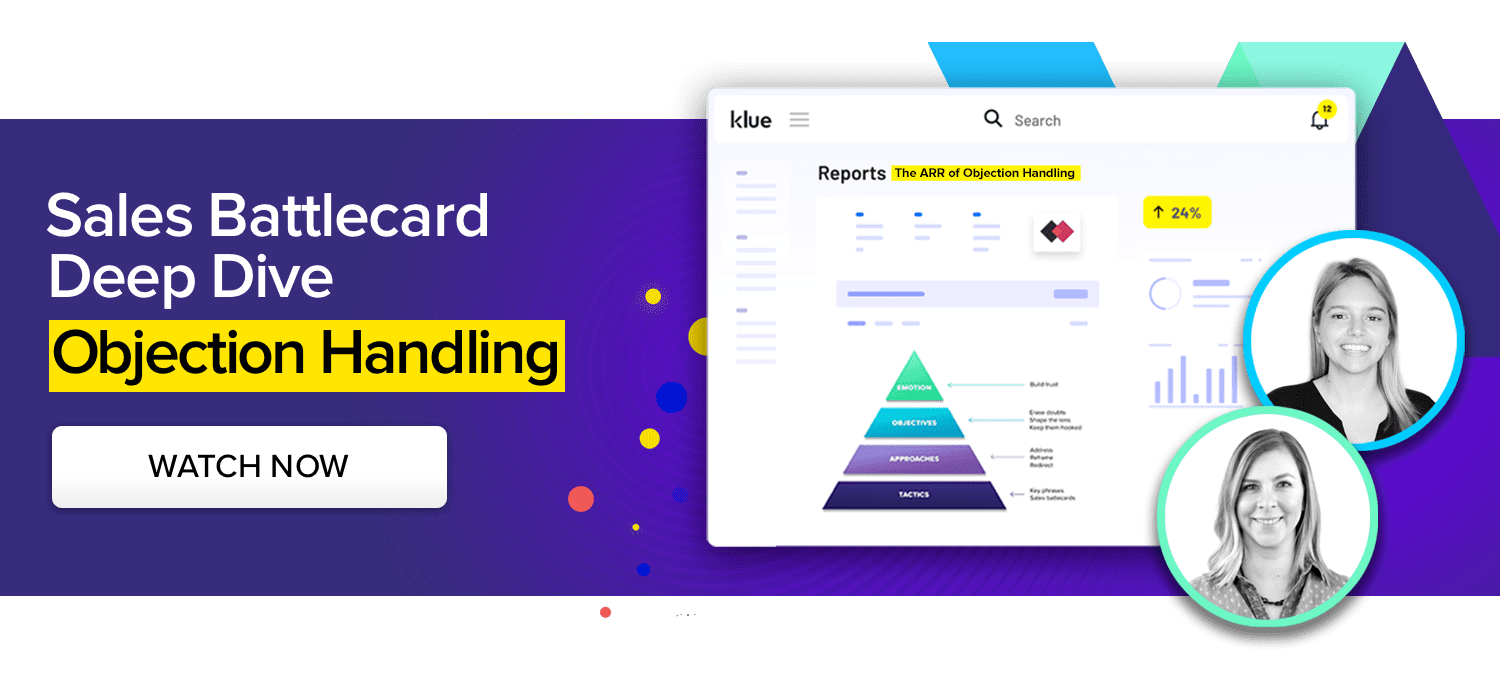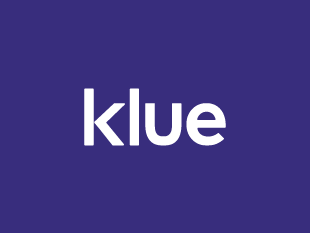Klue Compete
The Competitive Enablement Platform
Learn More
FIND OUT MORE >

The best answers to the question ‘what is objection handling in sales’ won’t come from a textbook or Investopedia page.
The sheer range of possibilities when it comes to objections in sales and how to handle them can’t be boiled down to one neat and tidy definition.
So instead of a dictionary definition of objection handling in sales, we went straight to the source.
We interviewed seven of Klue’s best sellers to get their best practices for competitive objection handling based on years of experience in the field.
Here’s what they had to say.


Check out our On-Demand webinar diving deep into handling objections that come from your competitor.
Objection handling in sales is being able to get to the actual meat of the questions and skepticism that people are having around your product or solutions ideas to fully understand the picture of what their needs are and how that can correlate to the solution you’re offering.
It’s the equivalent of Judo in martial arts for sales. It’s not necessarily about throwing a punch or kicking someone in the face. Instead, it’s about leveraging other people’s force and redirecting that to better position your angle in the way that you intended.
It’s part of the conversation. It’s bound to happen really. When I think that when I first got into sales, I thought that objections were a really bad sign that meant, ‘Oh dang, this conversation’s over’. They’re not interested. Really, it’s just a question. It’s something to help you get from A to B or A to Z.


The most common objection I hear is that timing isn’t right. Dig a little bit more into, OK, why isn’t the timing right? Everybody has different reasons. They might just be brushing you off, or they might have a legitimate reason. So kind of diving a little bit more into that can help you figure out the better way to overcome that objection with objection handling techniques.
That an organization has limited resources. And really, how I overcome that is acknowledging that this is something I hear a lot, and then actually sharing that’s why I’m reaching out. That our platform is a way to extend bandwidth or be able to scale efforts. So it really is for folks who have those limited resources.
The most common objection that I hear is about how much work it’s going to take when it comes to implementing or getting something off the ground. They want it to be 10 years ahead of where it is. The biggest way I combat that is usually talking about a partnership and leaning on that partnership and trust that we’ve built throughout the conversations we’ve had previously.
Watch author and sales coach David Premier break down the five rules for selling against the competition
One of my managers gave me some really good objection handling tips. The most memorable though would have to be around pricing. Pricing often comes up as an objection. When it does, that means you haven’t provided the value behind it. Because as soon as you do, pricing becomes less of a conversation.
Listen to the entire objection they’re giving you. Don’t interrupt them, even give some time for blank space after they finish talking. Acknowledge the objection. Make sure they’re feeling really understood. Ask for questions to move forward and confirm their understanding of your response. Then you can respond by addressing that objection.
The best piece of coaching I’ve received when it comes to objection handling is resist the pitch. It’s natural to want to get into that battle, give them a rebuttal and tell them why they’re wrong or not seeing things right. Try to understand how they might be perceiving things so that then you can put yourself in their shoes to better sell them on the idea.
I think something important to consider as a product marketer or anyone working in competitive enablement would be that oftentimes objections are folks just brushing you off. So it’s important to feel armed with talk tracks to overcome that and really get to the root of why they might have made that claim.
There’s a happy medium between not being too specific and not being too generic. I need to have options for different objections. Then having a ‘choose your own adventure’ that leads you through. The idea of “breadcrumbing” in content within content.
No objection is handled equally, so it’s great to have a talk track on how to overcome that objection. But it’s also great to have further questions to dig more into what the objection actually is. So having questions and follow-up talk tracks to help overcome the little-micro objections you start to encounter as you dig a little bit further.
Hear some of Chris Orlob’s best competitive selling tactics from his time leading the sales team at Gong.
I had a prospect that was super chipper. She opened my email like 15 times, so I called her. She was super excited. But then she wasn’t, because she actually thought I was her wine delivery guy. So that attitude changed once she realized that I wasn’t delivering wine.
Someone once said to me, ‘Hey, this is actually really interesting, but I am literally standing in line at the grocery store right now, and I don’t have time to talk’. You have to roll with it. Like, we’re not going to probably have this conversation while you’re in line at the grocery store. That’s a very fair objection.
The craziest objection I’ve ever heard was that they already have a perfect system in place. I feel like saying you have a perfect process and a perfect program means that you actually need to be staying up to date on what’s going on, what’s happening in the market. And if you’re not doing that, I don’t think it’s fair for you to claim that you have a perfect program.
Every seller we talked to all arrived at the same definition.
Objection handling is building a rapport with the buyer and asking strategic questions to go past the surface level objection being offered, to ultimately understand what’s actually holding them back.
Once you truly understand the problem that’s holding a buyer back, you can start solving their problems.
And win more deals.




Competitive Enablement
The topic of Large Language Models (LLMs) has a lot of confusion. Here's what you need to know about how Klue is working with them.


Competitive Enablement
Product Marketing
If your competitive intel game is too strong for automation, too pure for data privacy, and too rebellious for accuracy — then Klue AI is probably not for you.


Let’s do it. Tell us a bit about yourself and we’ll set up a time to wow you.
Let's do it. Tell us a bit about yourself and we'll set up a time to wow you.
XLet's do it. Tell us a bit about yourself and we'll set up a time to wow you.
XSubscribe to get our latest AI functionality and news in your inbox.
XOur Buyer Pulse feature, set to launch in Q2 2024, offers valuable insights into the factors influencing buyer decisions in your pipeline. By signing up for the waitlist, we can better gauge interest and proactively engage with you to streamline the setup and integration process before the feature becomes widely available.
X